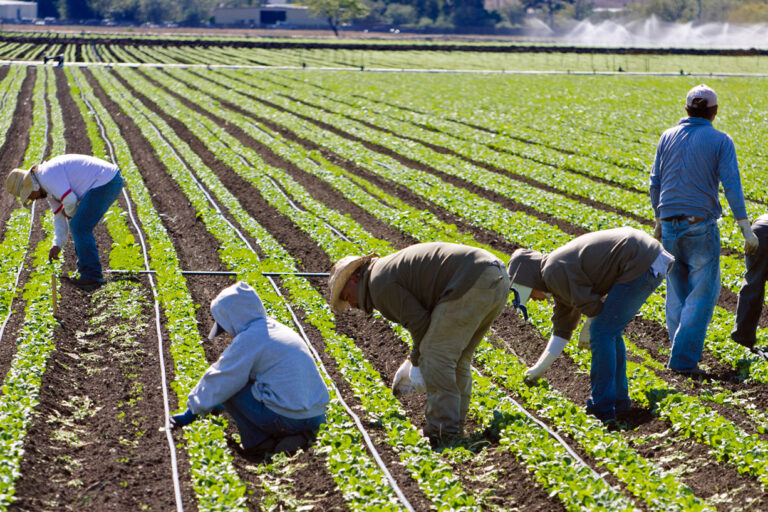Introduction
Temporary foreign agricultural workers (TFAWs) are a significant part of the agricultural workforce in Ontario. Nearly 40,000 temporary foreign agricultural worker positions are being approved each year in Canada, with over half of these in Ontario.
Workers in both programs are covered by provincial health and safety and workers’ compensation laws which are important factors given that agricultural work is one of the most dangerous occupations in Canada next to mining and construction (Flecker 2011)
They come from countries around the world to work in the agricultural sector, often on short-term contracts. As temporary workers, their employment rights and access to occupational health and safety protections are limited. This paper will explore the occupational health and safety protections and realities for TFAWs in Ontario and the possible avenues for the improvement of the safety and health of these workers.
TFAWs in Ontario are predominantly employed by the federal government’s Seasonal Agricultural Worker Program (SAWP) and the Ontario government’s Agricultural Workforce Development Program (AWDP). Both of these programs are designed to provide access to temporary foreign workers for employers who are unable to find Canadian citizens or permanent residents to fill their labor needs. TFAWs are employed in a variety of agricultural sectors, including fruit and vegetable farming, dairy farming, greenhouse and nursery production, and livestock production.
The Ontario government works in partnership with ESDC (Employment and Social Development Canada) to ensure that the TFAWP is administered in a fair and transparent manner. The government also provides support to employers and foreign workers to ensure that their rights and responsibilities are respected. In addition, the government works to ensure that the program is not abused and that foreign workers are not exploited.
In Ontario, TFAWs have access to the same occupational health and safety protections as Canadian workers. The Occupational Health and Safety Act (OHSA) protects all workers in Ontario, regardless of their immigration status, and provides them with the right to refuse work they believe to be unsafe. The law also requires employers to provide a safe and healthy workplace and to provide workers with the necessary protective equipment, training, and information.
- Main Challenges
While agricultural work is hazardous for all workers, migrant workers face additional challenges that make them more vulnerable. Farming has consistently been ranked among the province’s most dangerous occupations regarding fatal and nonfatal work-related injuries (Locker et al., 2002). Some studies among farmers and agricultural workers have revealed that these populations face specific risks for both injury and illness.
In this regard, the main challenges that TFAWs face in accessing and enforcing these protections are (Aversa 2015):
- Language barriers: Temporary Foreign Agricultural Workers often do not speak adequate English, making it difficult for them to properly communicate with their employers and coworkers. This can lead to misunderstandings and difficulty in understanding instructions.
- Limited job security: Temporary Foreign Agricultural Workers are not guaranteed job security and are often subject to seasonal contracts and unpredictable work hours. This makes it difficult to plan for the future and can lead to financial instability.
- Poor working conditions: Many Temporary Foreign Agricultural Workers are subjected to difficult working conditions, including long hours, low pay, and hazardous environments.
- Vulnerability to exploitation: As Temporary Foreign Agricultural Workers are unfamiliar with the laws and regulations of the country they are working in, they may be vulnerable to exploitation by employers.
- Access to healthcare: Temporary Foreign Agricultural Workers may have limited access to healthcare services due to their lack of documentation. This can lead to health issues going untreated and can be a cause of financial strain.
- Social isolation: Temporary Foreign Agricultural Workers may be isolated from their families and communities and may experience loneliness and homesickness. This can lead to mental health issues such as depression and anxiety.
In addition to these challenges, there is a growing body of evidence suggesting that Ontario’s OHS legislation and policy contain significant gaps in terms of providing meaningful and comprehensive protections for the particularly vulnerable workforce of migrant farmworkers. In general, migrant workers are under-trained and under-equipped to deal with the multiple hazards that they encounter in their workplaces (McLaughlin et al. 2014)
In order to ensure that TFAWs have access to the same occupational health and safety protections as other workers in Ontario, it is important that employers are educated about their obligations under the OHSA, and that TFAWs are provided with the necessary information and resources to understand and exercise their rights. Furthermore, government and advocacy organizations should work to create a culture of safety among TFAWs, and to provide them with the necessary support and resources to report unsafe working conditions without fear of repercussions.
Conclusion:
Overall, the TFAWP in Ontario is an important tool for employers to fill their labour needs in a timely and efficient manner. By working in partnership with the government and other stakeholders, employers can ensure that their operations are compliant with all applicable laws and regulations, and that foreign workers can be provided with fair and equitable working conditions.
Bibliography:
Aversa, Theresa 2014. Crisis of Control: OHS and Worker’s Compensation in Canada’s Migrant Agricultural Workers’ Programs.
Flecker, Karl. 2011. Canada’s Temporary Foreign Worker Program (TFWP) Model Program—Or Mistake? Canadian Labour Congress.
Locker et al.. 2002. Agricultural machinery injuries in Ontario, 1985-1996: a comparison of males and females.
McLaughlin et al. 2014. Paper versus Practice : Occupational Health and Safety Protections and Realities for Temporary Foreign Agricultural Workers in Ontario

